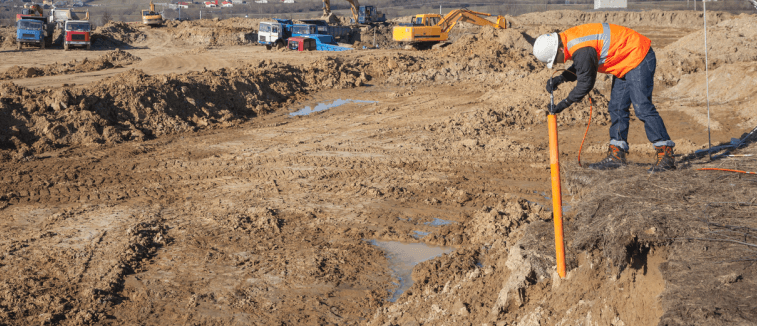An Unbiased View of Geotheta
Table of ContentsThe Best Strategy To Use For Geotheta8 Easy Facts About Geotheta ExplainedThings about Geotheta4 Easy Facts About Geotheta ExplainedThe 6-Second Trick For Geotheta

They carry out site examinations, collect samples, execute laboratory tests, and examine information to examine the suitability of the ground for building jobs - Geo Tech Engineering. Based on their searchings for, geotechnical designers provide recommendations for foundation design, incline security, keeping structures, and reduction of geotechnical dangers. They team up with various other professionals, such as architects, structural engineers, and building and construction teams, to make sure that geotechnical considerations are integrated into the total job design and application
By examining the habits and residential properties of dirt and rock, they can determine possible geotechnical hazards such as landslides, dirt settlement, or slope instability. Their experience aids prevent failings or crashes that can jeopardize lives and residential or commercial property. Below are some detailed obligations and obligations of a geotechnical engineer: Site Examination: Geotechnical designers conduct site examinations to gather data on subsurface conditions.
They translate the data to comprehend the buildings and behavior of the dirt and rock, including their stamina, permeability, compaction attributes, and groundwater problems. Geotechnical Evaluation and Layout: Geotechnical engineers analyze the information collected throughout website examinations to examine the security and viability of the site for construction tasks. They perform geotechnical estimations and modeling to review aspects such as bearing ability, settlement, incline stability, side earth stress, and groundwater flow.
The Facts About Geotheta Revealed
Foundation Layout: Geotechnical designers play an important role in designing foundations that can securely support the designated framework. They analyze the dirt problems and lots demands to identify the ideal structure kind, such as shallow structures (e.g., grounds), deep structures (e.g (https://trello.com/u/geotheta)., stacks), or specialized methods like soil improvement. They take into consideration factors such as settlement limits, birthing capability, and soil-structure interaction to create optimum structure designs
They assess construction strategies, screen website activities, and conduct field inspections to validate that the layout referrals are followed. If unpredicted geotechnical issues occur, they examine the scenario and offer suggestions for removal or changes to the style. Danger Analysis and Reduction: Geotechnical designers evaluate geotechnical risks and risks connected with the project website, such as landslides, liquefaction, or soil erosion.

Partnership and Communication: Geotechnical designers function carefully with other professionals associated with a task, such as architects, architectural engineers, and building and construction teams. Efficient interaction and collaboration are vital to integrate geotechnical considerations right into the general project design and building process. Geotechnical designers offer technological competence, response queries, and guarantee that geotechnical demands are fulfilled.
5 Easy Facts About Geotheta Shown
Below are some sorts of geotechnical engineers: Foundation Engineer: Structure designers focus on designing and examining foundations for structures. They examine the soil conditions, load demands, and site features to establish the most ideal structure kind and design, such as shallow foundations, deep structures, or specialized methods like heap foundations.
They evaluate the variables influencing slope security, such as dirt residential or commercial properties, groundwater conditions, and incline geometry, and develop strategies to stop slope failings and reduce dangers. Earthquake Designer: Earthquake engineers focus on evaluating and developing structures to endure seismic pressures. They analyze the seismic risk of a website, assess dirt liquefaction capacity, and develop seismic design requirements to ensure the security and durability of structures throughout quakes.
They carry out area testing, collect examples, and evaluate the collected information to identify the dirt residential or commercial properties, geologic formations, and groundwater problems at a website. Geotechnical Instrumentation Designer: Geotechnical instrumentation designers concentrate on monitoring and gauging the actions of dirt, rock, and frameworks. They mount and keep instrumentation systems that check variables such as soil negotiation, groundwater levels, slope motions, and architectural displacements to examine efficiency and give early warnings of possible problems.
Geotheta for Beginners
They carry out tests such as triaxial examinations, consolidation tests, direct shear tests, and permeability tests to collect data for geotechnical analysis and layout. Geosynthetics Engineer: Geosynthetics engineers focus on the design and application of geosynthetic materials, such as geotextiles, geogrids, and geomembranes. They utilize these materials to improve dirt security, strengthen inclines, offer drainage options, and control erosion.
They often tend to be investigatory people, which means look at more info they're intellectual, reflective, and inquisitive. They are interested, methodical, sensible, logical, and sensible. A few of them are additionally social, indicating they're kind, generous, cooperative, person, caring, helpful, compassionate, tactful, and pleasant. Does this seem like you? Take our complimentary profession test to figure out if geotechnical engineer is just one of your top career matches.
In the office environment, geotechnical engineers utilize specialized software tools to perform calculations, create layouts, and analyze information. They prepare reports, review task specifications, communicate with clients and team members, and coordinate task activities. The workplace setup gives a conducive environment for research, evaluation, and partnership with various other professionals associated with the project.
Indicators on Geotheta You Need To Know
They regularly see job sites to carry out website investigations, evaluate geotechnical problems, and gather information for analysis. These visits entail taking a trip to various areas, occasionally in remote or difficult surfaces. Geotechnical engineers might do soil sampling, conduct examinations, and screen building and construction activities to make certain that the geotechnical elements of the project are being executed properly.
Geotechnical designers additionally work in specialized geotechnical labs. Geotechnical lab designers work thoroughly in these atmospheres, taking care of screening devices, operating instruments, and recording information.